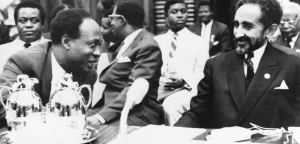 The Journey to the Formation of the OAU
The Journey to the Formation of the OAU
In 1958 at the all-African people`s conference in, Accra-Ghana, all the speakers at the conference from the West African nations unanimously spoke against the prevailing racism and colonialism that was happening in Africa at the time. They called on Africans to unite in their fight for liberation from colonialism. The Pan-African Freedom Movement of East and Central Africa (PAFMECA) was formed in 1958 to campaign for the independence of the countries of East and Central Africa from colonial and white minority rule, although this movement was short-lived.
The Casablanca group (7th January 1961), composed of Ghana, Guinea, Mali, Morocco, and the Algerian Provisional Government, felt that the independent African countries required political unity and continental integration for the African people.
The Monrovia group (8th -12th May 1961) was composed of Liberia, Ivory Coast (now Côte d’Ivoire), Cameroon, Senegal, Malagasy Republic (now Madagascar), Togo, Dahomey (now Benin), Chad, Niger Upper Volta (now Burkina Faso), Congo Brazzaville, Central Africa Republic, Gabon, Ethiopia and Libya called for a market-driven development economy.
To a stunned world that had dismissed the possibility of African Unity, all these regional groupings decided to come together to uphold the dignity of Africa and form a united front to fight for the complete independence of Africa’s peoples. In May 1963, Kwame Nkrumah of Ghana, Emperor Haile Selassie of Ethiopia, and Gamal Abdel Nasser of Egypt convened a meeting of thirty-two newly independent African countries in Addis Ababa, Ethiopia which culminated in the formation of the Organization of African Unity (O.A.U) which was a manifestation of the Pan-African vision for an Africa that was united, free and in control of its destiny and this was solemnized on May 25th (Africa Day) 1963, in the OAU Charter which spelled out the purpose of the Organisation namely:
- To promote the unity and solidarity of the African States;
- To coordinate and intensify their cooperation and efforts to achieve a better life for the peoples of Africa;
- To defend their sovereignty, territorial integrity, and independence;
- To eradicate all forms of colonialism from Africa; and
- To promote international cooperation, having due regard to the Charter of the United Nations and the Universal Declaration of Human Rights.
To achieve these goals, Member States pledged to harmonize their policies in Political and Diplomatic cooperation; Economic Cooperation, including transport and Communication; Educational and Cultural Cooperation; Health, Sanitation and Nutritional Cooperation; Scientific and Technical Cooperation; and Cooperation for defence and security.
Attainment of these objectives was predicated on the following seven fundamental principles:
- The Sovereign Equality of all Member States;
- Non-interference in the internal affairs of the state;
- Respect for Sovereignty and Territorial Integrity of each and its inalienable right to independent existence;
- Peaceful Settlement of Disputes by negotiation, mediation, conciliation and arbitration;
- Unreserved condemnation in all forms of political assassination as well as of subversive activities on the part of neighboring States or any other State;
- Absolute dedication to the total emancipation of the African territories, which are still dependent; and
- Affirmation of a policy of non-alignment of all blocs.
In 1999, the Assembly of Heads of State and Government of the OAU decided to convene an extraordinary session to expedite the process of economic and political integration in the continent. On 9.9.1999, the Heads of State and Government of the OAU issued a Declaration (The Sirte Declaration) calling for the establishment of an African Union (9 September–African Union Day). In 2002 during the Durban Summit, the African Union (AU) was officially launched as the successor to the Organisation of African Unity.
The decision to re-launch Africa’s Pan-African organization was the outcome of a consensus by African leaders that to realize Africa’s potential, there was a need to refocus attention from the fight for decolonization and apartheid, which had been the focus of the OAU, towards increased cooperation and integration of African states to drive Africa’s growth and economic development. The continent re-dedicated herself to the attainment of the Pan-African Vision of “An integrated, prosperous and peaceful Africa, driven by its citizens, representing a dynamic force in the international arena.”
To achieve this vision, the Agenda 2063 development Framework was developed following extensive consultations involving all formations of African society to define social and economic development, integration, democratic governance, and peace and security, as the planks of the vision. Agenda 2063 is therefore an Agenda to which every African woman, man, girl, and boy has contributed directly or indirectly, and therefore has a stake in its implementation. The inclusive approach adopted in the design of the Agenda 2063 First Ten-Year Implementation Plan was pivotal in creating a sense of ownership of the agenda among a range of stakeholders.
The Headquarters of the OAU General Secretariat was located at the Africa Unity House in Addis Ababa, Ethiopia, and was headed by an Administrative Secretary-General, assisted by five Assistant Secretary Generals all of whom were appointed by the Heads of State and Government. Following the transformation of OAU to the African Union (AU), Addis Ababa remains the headquarters of the AU with the AU Commission leadership consisting of elected officials – the Chairperson, Deputy Chairperson, and 6 Commissioners and a fully functional secretariat composed of staff from the 55 member states.
Source- African Union.com